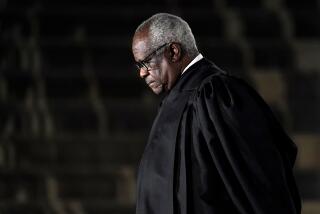Blackmun Raps Lawyer for Fee of $290 an Hour
- Share via
WASHINGTON — A Supreme Court justice today criticized a Denver lawyer, who is a former Stanford Law School dean, over the fees he is charging as the court’s “special master” in a case.
Justice Harry A. Blackmun, dissenting from a court order granting Charles J. Meyers $69,661 in interim fees, complained about the hourly rates many large law firms charge and said they lend support to a public feeling of dissatisfaction and distrust of lawyers.
Meyers is a partner in the Denver office of the Los Angeles-based law firm of Gibson, Dunn & Crutcher.
Meyers in 1984 was appointed as special master in a still-pending dispute between Texas and New Mexico over use of Pecos River water.
Texas Suing New Mexico
Texas is being allowed to sue New Mexico in the Supreme Court before the case has been heard by any lower court. In such cases, the justices invoke the court’s original jurisdiction and hire a special master to conduct hearings and make recommendations.
Meyers’ submitted bill of over $69,000 represents work he and an associate of his law firm, Diana Poole, have devoted to the case since late 1986.
Meyers’ bill, to be paid by Texas and New Mexico, reflects compensation averaging $275.12 an hour for himself and $191.30 for Poole.
In his dissenting opinion, Blackmun noted that many of the 246 hours Poole spent working on the case represented getting herself familiar with the legal issues. Another associate in Meyers’ law firm, Steven Crafton, had been assigned similar duties before leaving the firm’s Denver office and Blackmun called Poole’s work “duplicative.”
$290 an Hour Questioned
“The consequences of Crafton’s departure hardly are to be charged to these litigants,” Blackmun said.
He added: “It also is difficult for me to accept the fact that in Denver, Colo., this partner’s time is now worth $290 an hour, having been increased from $265 on Nov. 1, 1987, and that the time of Ms. Poole is now worth $200 an hour, having been elevated from $170 beginning Nov. 1, 1987.
“It seems to me that ‘establishment’ law firms are doing themselves and the public a disservice by asserting fees of this magnitude so persistently over dissents from the court.
“Public dissatisfaction with lawyers is not unknown; neither is public distrust of lawyers. A fee application of this kind tends to build that dissatisfaction and that distrust,” Blackmun said.
More to Read
Sign up for Essential California
The most important California stories and recommendations in your inbox every morning.
You may occasionally receive promotional content from the Los Angeles Times.













